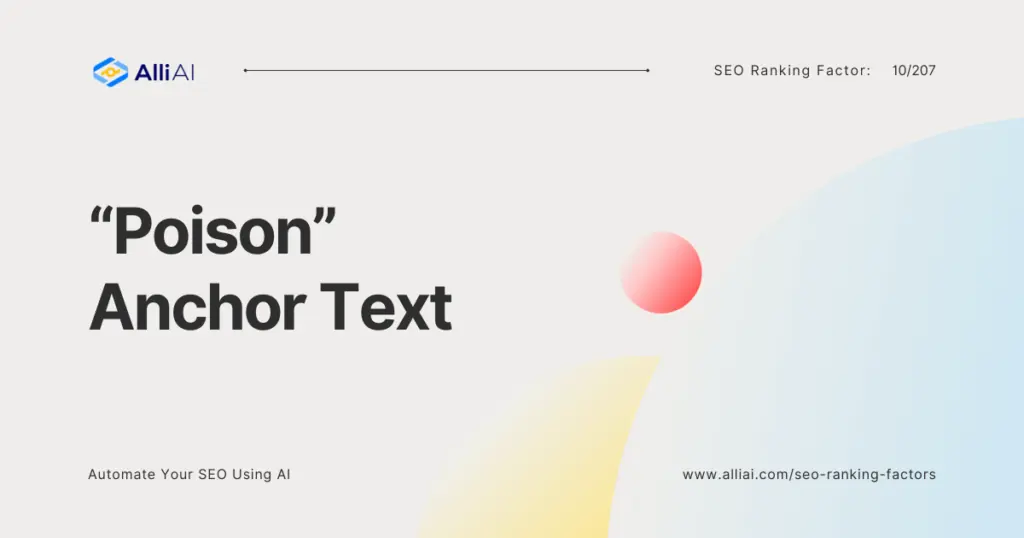What is Poison Anchor Text?
Poison anchor text involves the use of harmful or toxic keywords in the anchor text of links pointing to a website. These are typically keywords that violate search engine guidelines or are associated with spammy or untrustworthy content. A real-life analogy to poison anchor text could be like having a bad referral or recommendation from someone who has a notorious reputation; it hurts your credibility in the eyes of others who value their opinion, in this case, the search engines.
Why is Poison Anchor Text Important in SEO?
Poison anchor text isn’t merely about using “bad” keywords. It’s any anchor text that screams manipulation or spam to search engines. This includes:
- Over-Optimized Anchors: Imagine every link to your “best vegan recipes” page using the exact phrase “best vegan recipes.” That’s over-optimization, and it’s unnatural.
- Irrelevant Anchors: “Click here,” “this website,” or anything that doesn’t describe the linked content is a red flag. It’s like a signpost pointing nowhere.
- Spammy Anchors: Think of those shady forum posts or blog comments packed with links like “buy Viagra online.” Yikes.
- Adult or Offensive Anchors: Enough said. These have no place in legitimate SEO.
- Brand Name + Keyword Anchors: Even using your brand name alongside a keyword (e.g., “Alli AI SEO tools”) can seem manipulative if overdone.
Search engines like Google view these as desperate attempts to game the system. The result? Algorithmic penalties, manual actions by Google’s webspam team, or even a complete exile from search results.
How Poison Anchor Text Affects SEO
Search engines have become Sherlock Holmes when it comes to unnatural link patterns. Poison anchor text is a smoking gun, a clear sign that a website might be trying to pull a fast one. Here’s why it raises alarms:
- Link Schemes: Poison anchor text often goes hand-in-hand with link schemes – buying, selling, or exchanging links to artificially boost rankings. Google’s Webmaster Guidelines explicitly forbid this.
- Terrible User Experience: Users want links that accurately describe what they’ll find. Misleading anchor text is like a bait-and-switch, frustrating users and driving them away. Search engines track this behavior and penalize sites accordingly.
- Algorithm Updates: The Penguin Strikes Back: Google’s Penguin update, launched in 2012, is specifically designed to hunt down and penalize websites with unnatural link profiles, including those riddled with poison anchor text. Websites hit by Penguin have seen their traffic plummet by 50% or more – a chilling reminder of the stakes involved.
Why Poison Anchor Text is bad for your Website?
Think of poison anchor text as a virus. It doesn’t just infect the linked page; it spreads throughout your website, weakening its SEO health:
- Devalued Backlinks: Search engines may completely disregard the value of backlinks with poison anchor text. It’s like having a reference from a known liar – it holds no weight.
- Lower Domain Authority: Domain Authority (DA), a metric from Moz, predicts how well a site will rank. Toxic backlinks drag down your DA, making it harder to compete for top spots in search results.
- Risk of Penalties: The more poison in your backlink profile, the higher the risk of penalties. These can range from algorithmic demotions to manual actions, both of which can be devastating for your website’s traffic and reputation.
Step-by-Step Guide to Managing Poison Anchor Text
- Conduct Thorough Link Audits: Regularly review your backlink profile to identify any links with suspicious or irrelevant anchor text.
- Engage in Proactive Disavowal: Utilize Google’s Disavow Tool to distance your site from harmful links, effectively removing their negative impact on your SEO.
- Develop a Natural Linking Strategy: Focus on acquiring backlinks with natural, relevant anchor text that genuinely reflects the linked content.
How Can Alli AI Help with Poison Anchor Text?
At Alli AI, we understand the critical role anchor text plays in your website’s SEO strategy. Our tool has been designed to help identify and remediate the use of poison anchor text pointing to your site. Here’s how we can assist:
- Link Audit: We conduct thorough audits of your site’s backlink profile to identify links with toxic anchor texts. Our sophisticated algorithms can pinpoint potentially harmful links that could be affecting your site’s rankings.
- Anchor Text Optimization: We provide recommendations for optimal anchor text distribution, helping you maintain a natural and varied anchor text profile that boosts your SEO without crossing into manipulative tactics.
FAQ
How often should I conduct a link audit for poison anchor text?
You should conduct a link audit at least quarterly. Regular audits help catch any potentially harmful links early before they significantly impact your SEO performance.
Can I fix poison anchor text issues by myself?
While it’s possible to address some issues independently, such as reaching out to webmasters to change or remove links, using a tool like Alli AI streamlines the process and ensures no harmful links are overlooked.
Are all unnatural links considered poison anchor text?
Not all unnatural links use poison anchor text, but any link that manipulates search rankings can be harmful. It’s important to focus on building a natural and high-quality backlink profile.






